Art Saves:
Susan Wojnar on music, writing
and mental health
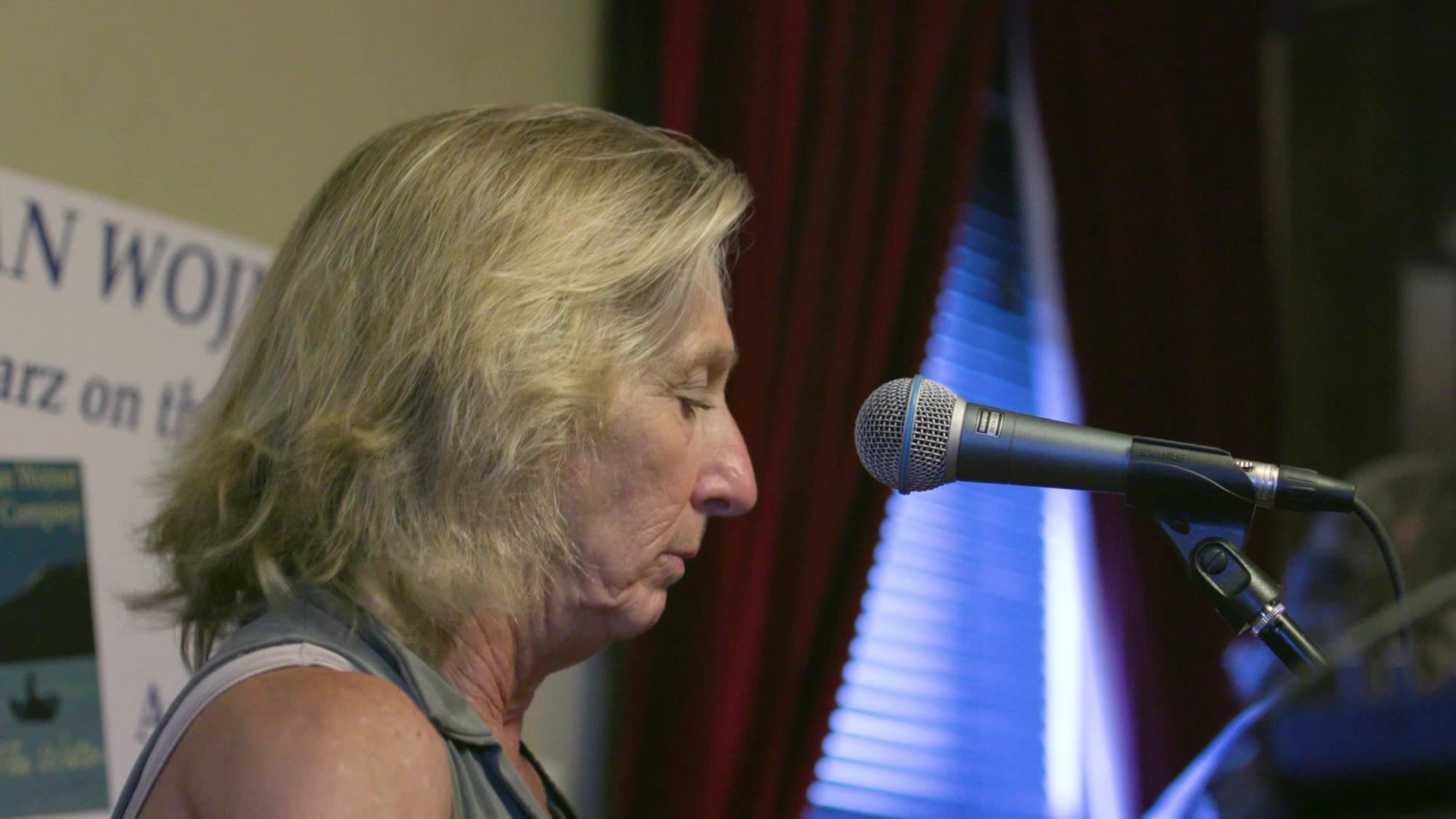
Editor's note: This story is part of a series exploring how art saves people’s lives. Whether someone faces mental illness, systemic social barriers or any other challenges, art in its many forms offers a way to express, heal, transform and find joy.

For nearly a decade, Susan Wojnar was isolated from her family, alone in confusing realities with nagging voices and unsettling visions.
After many years of suffering in silence, she finally had a word to describe what she was experiencing: schizophrenia.
“I didn't realize how lonely I was, because I had constant company in my head,” Wojnar said. “I was seeing things, hearing things, having very disturbing thoughts. I didn't really realize how alone I was.”
Two passions sustained her throughout her journey to diagnosis and recovery: music and writing.
A musician since her grade school years, Wojnar, now 61, performs regularly throughout the region with her guitar and gives presentations on her experiences living with mental illness.
In August 2023, she published a book, “White Darkness: Poetic Tales of the Schizophrenic Experience,” in which she describes in vivid detail the thoughts, sounds and emotions that became part of her everyday life.
Wojnar performs her song "Show Me," a track from her 2023 album, "Starz on the Water." [Tom Gregory]
Wojnar describes her childhood as “idyllic.” They were a family with two sisters, a steelworker father and stay-at-home mother. She grew up on a quiet, dead-end street in a neighborhood of New Castle, Pennsylvania, the kind of place where everyone looks out for each other.
“My parents were very involved with us,” Wojnar said. “Whatever we were interested in, they helped us pursue.”
One of her early interests was learning to play the piano, something that stemmed from her parents’ love of classical music.
As she reached her teenage years, her musical tastes changed. Though her study of the piano fell by the wayside, she never let go of her interest in music.
"What was I like as a kid? Normal. Whatever that means."
Music and education
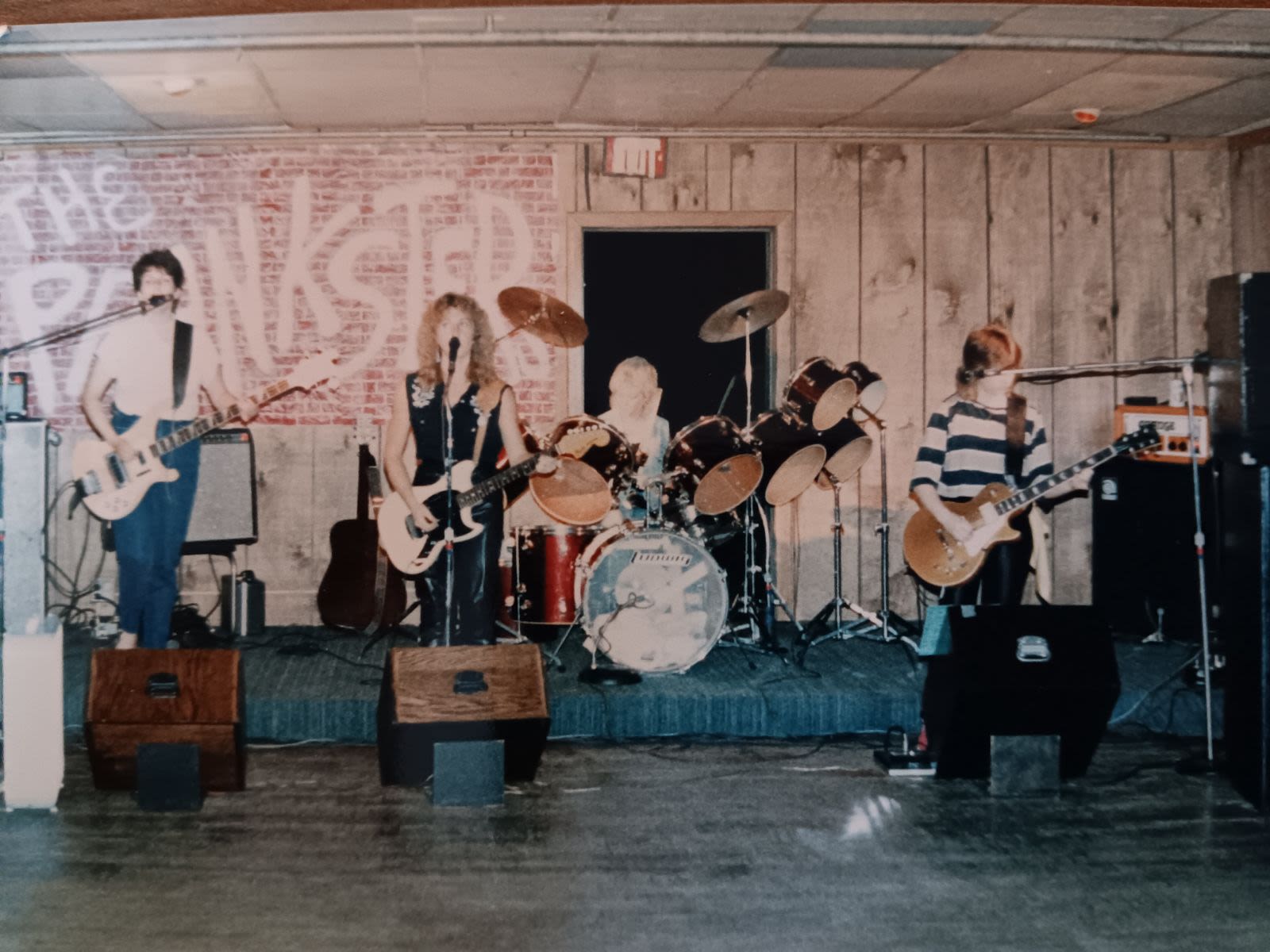
In addition to her passion for music, Wojnar also had a deep love of reading and writing, which contributed to her aspirations to become a journalist as she prepared to enter college in 1981.
“That didn't exactly work out as planned,” she said. “I got a guitar and life changed.”
Much like her interest in studying piano waned, Wojnar’s interest in college took a backseat to the allure of learning the guitar.
She took the next step by answering an ad in the paper: An aspiring female bass player was looking to form an all-girl band.
“I saw the ad, and I could barely play three chords, which is a common story in rock ‘n’ roll, you know, three chords and some attitude,” Wojnar said. “So that was us.”
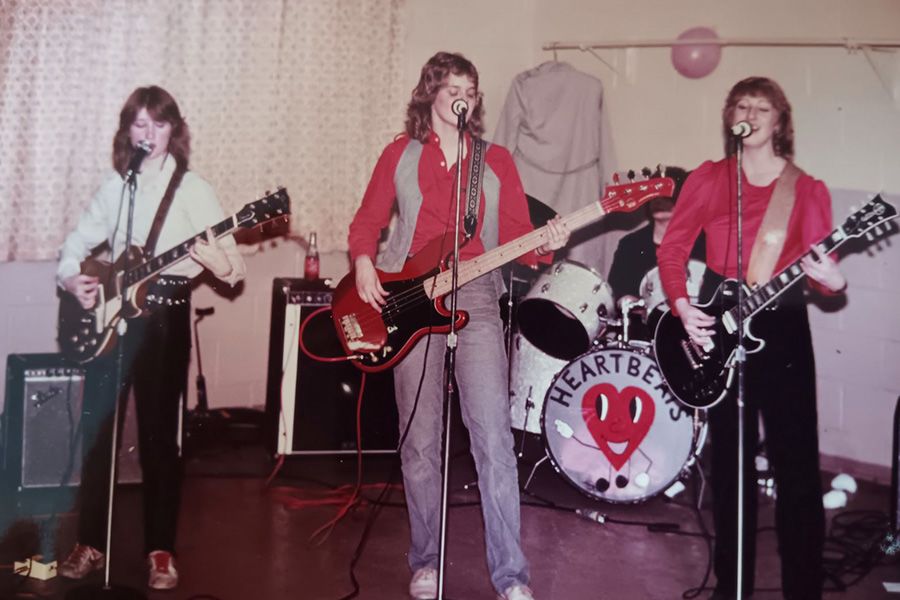
The Heartbeats were Cyndi Brawley (left); Terri Reiter (center); Ethan Gitschier, formerly known as Kim (drums), and Wojnar (far right).
The Heartbeats were Cyndi Brawley (left); Terri Reiter (center); Ethan Gitschier, formerly known as Kim (drums), and Wojnar (far right).
It was the early ‘80s and the name of the band was The Heartbeats, made up of the two founding members and two additional women playing ‘60s covers. The group later transitioned into another all-girl band called The Pranksters, where the sound evolved to classic rock and the group performed original material.
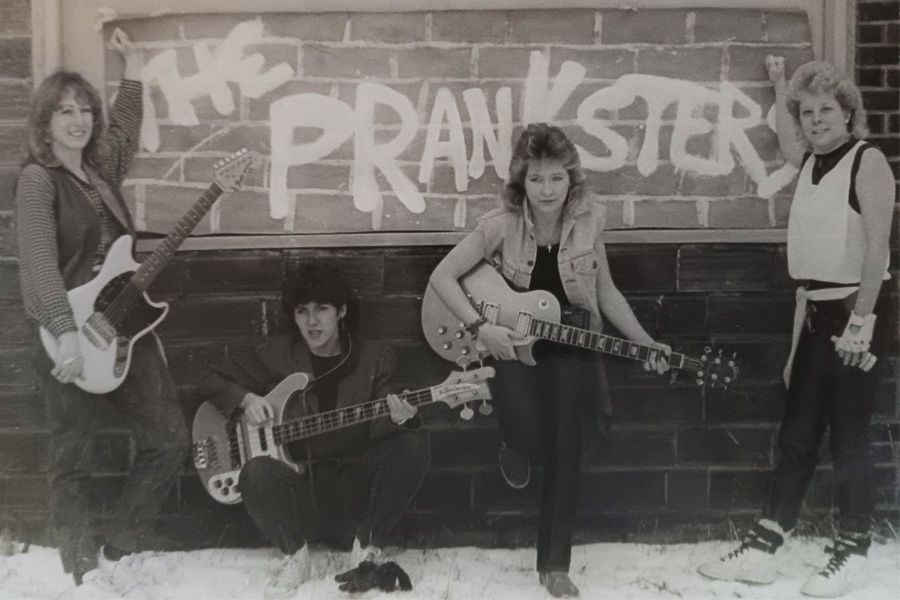
Wojnar (far left) with Julie Fanselow, Cyndi Brawley and Ethan Gitschier, formerly known as Kim, as The Pranksters.
Wojnar (far left) with Julie Fanselow, Cyndi Brawley and Ethan Gitschier, formerly known as Kim, as The Pranksters.
Wojnar’s focus shifted in 1987 after the birth of her son, Skylar. Several years later as she was entering her 30s, she said it felt like time to return to school and her original love of journalism and writing.
She completed her bachelor’s degree in 1995 at Youngstown State University, followed by her master’s degree in 1999. Without any new professional plans, she continued her career in music. At that time, she was one-half of a duo called Foolscircle, performing throughout Cleveland, Youngstown and Pittsburgh.
By the time the ‘90s were ending, an unexplained change began happening in the ways she was experiencing reality.
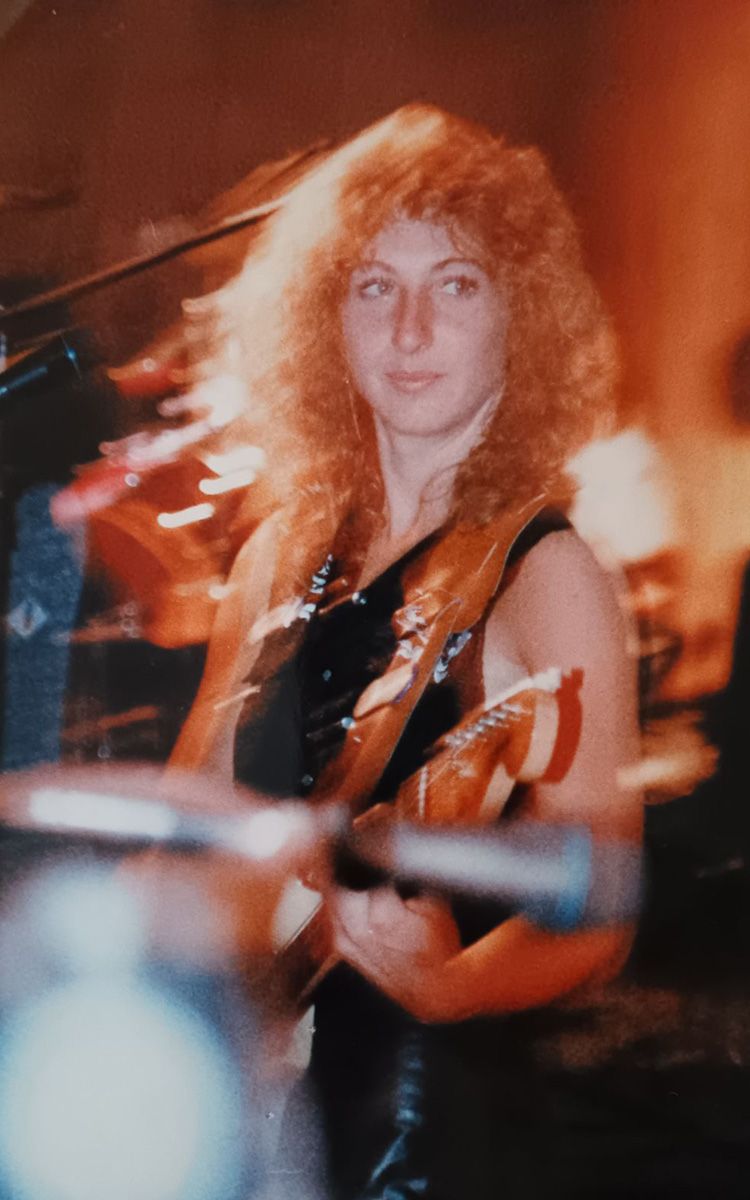
Wojnar performing with the all-girl band The Pranksters in 1986.
Wojnar performing with the all-girl band The Pranksters in 1986.
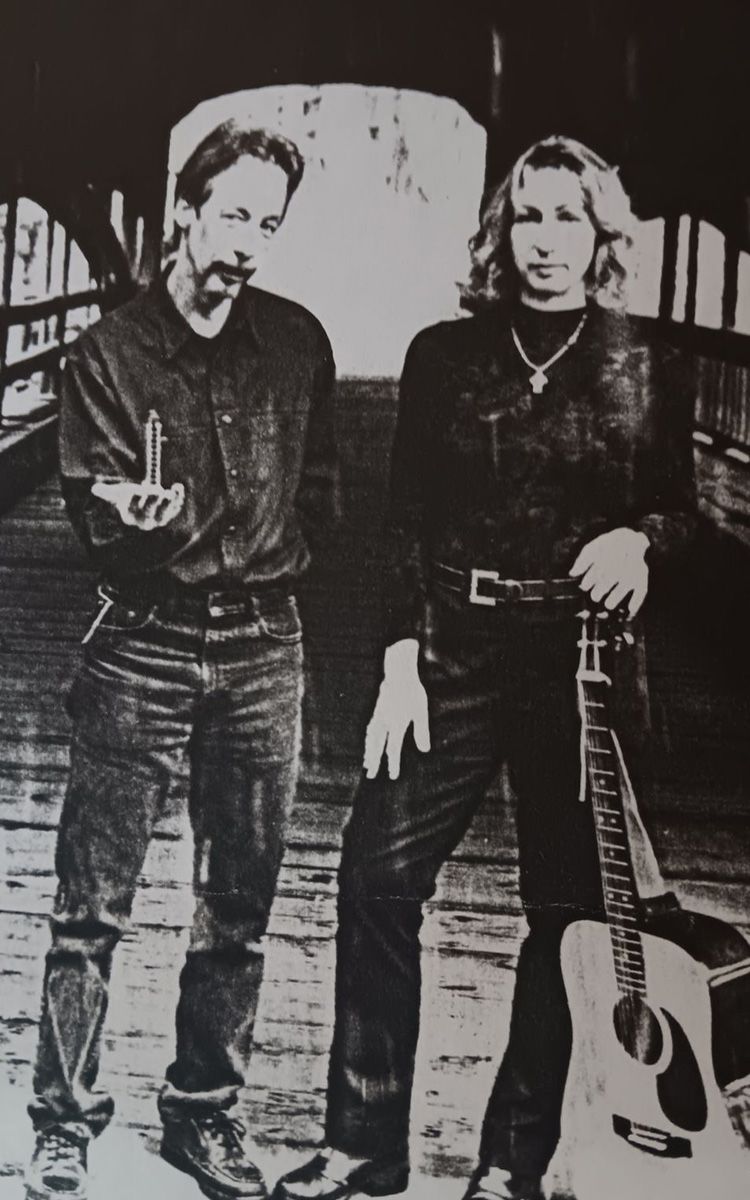
Wojnar with harmonica player Pix Ensign performing as the duo Foolscircle in the late '90s.
Wojnar with harmonica player Pix Ensign performing as the duo Foolscircle in the late '90s.
Onset of schizophrenia
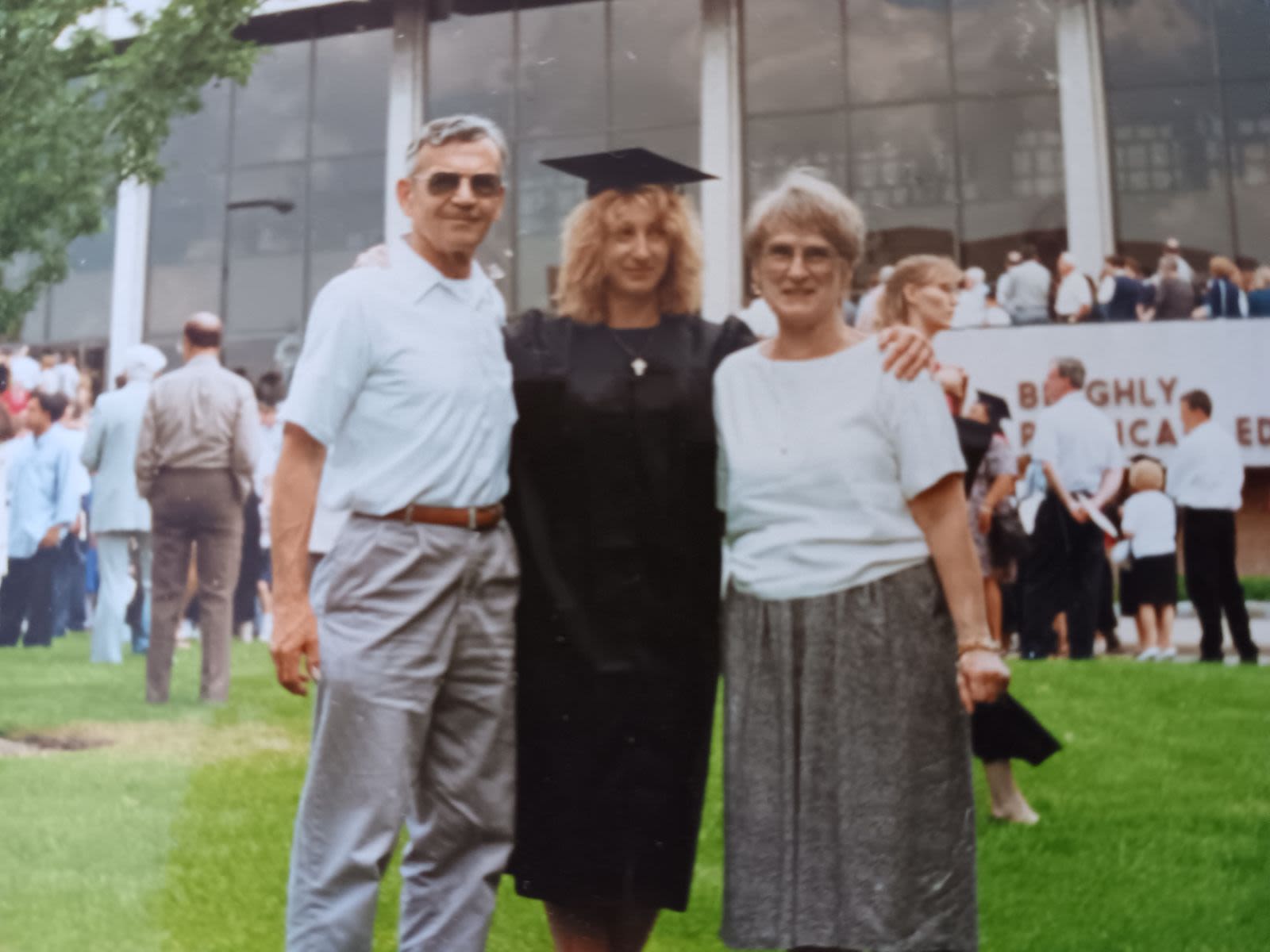
Wojnar pinpoints the onset of her schizophrenia to shortly after completing graduate school when she was 38 years old.
“I didn't know if that was keeping me going somehow, the constant reading and writing and being so involved,” she said. “And then graduation came, and there was this dearth.”
At the onset, the symptoms were mild, she recalled, compared to what developed later. Paranoia crept in and led to her imagining people were saying negative things about her behind her back.
“I was starting to misperceive the world,” Wojnar said. “It gradually became something where I was experiencing a completely alternate reality.”
She said that in the beginning she was experiencing reality but misinterpreting it. Everything around her started to become symbolic in a negative way, and she’d read into things that would feed the paranoia. Because many of the misperceptions were negative, she began to withdraw.
"There was a lot of wandering in the wilderness."
Long road to diagnosis
As time went on, Wojnar’s schizophrenia worsened and morphed into her experiencing things that nobody else was seeing or hearing or thinking - the break with reality becoming more serious.
She would hear the voices of family members in her head saying horrible things.
“They were literally telling me, ‘We don't love you. We're just using you. We wish you would go away.’ And I thought this was all real. I thought they were doing it on purpose.”
The voices eventually caused her to flee. She was living then in Struthers, Ohio, south of Youngstown, and decided to move to Cleveland. Her family assumed she was taking drugs and heading in a bad direction.
“Nobody knew what was wrong with me,” she said. “Mental health issues were not talked about.”
Reaching out for help didn't happen until around 2005, when Wojnar had what she describes as a complete psychotic break. One day while living near the border of Cleveland Heights and East Cleveland, she could hear the roar of power tools throughout the neighborhood, the sounds becoming increasingly louder.
“I thought people were doing it on purpose to drive me out of the neighborhood. So, I thought, ‘OK, I have to leave,’” she said.
Without a plan, she got in her car and started driving aimlessly.
The bright sun caused her to grow weak, and she eventually pulled over to the side of the road. Police found her and took her to a nearby hospital.
“I don't remember being told I was being taken there,” Wojnar said. “And then I remember the locked doors slamming shut behind me and seeing that there were chains on the door, and I realized where I was. And it's like, ‘Oh, you're not leaving anytime soon.’”
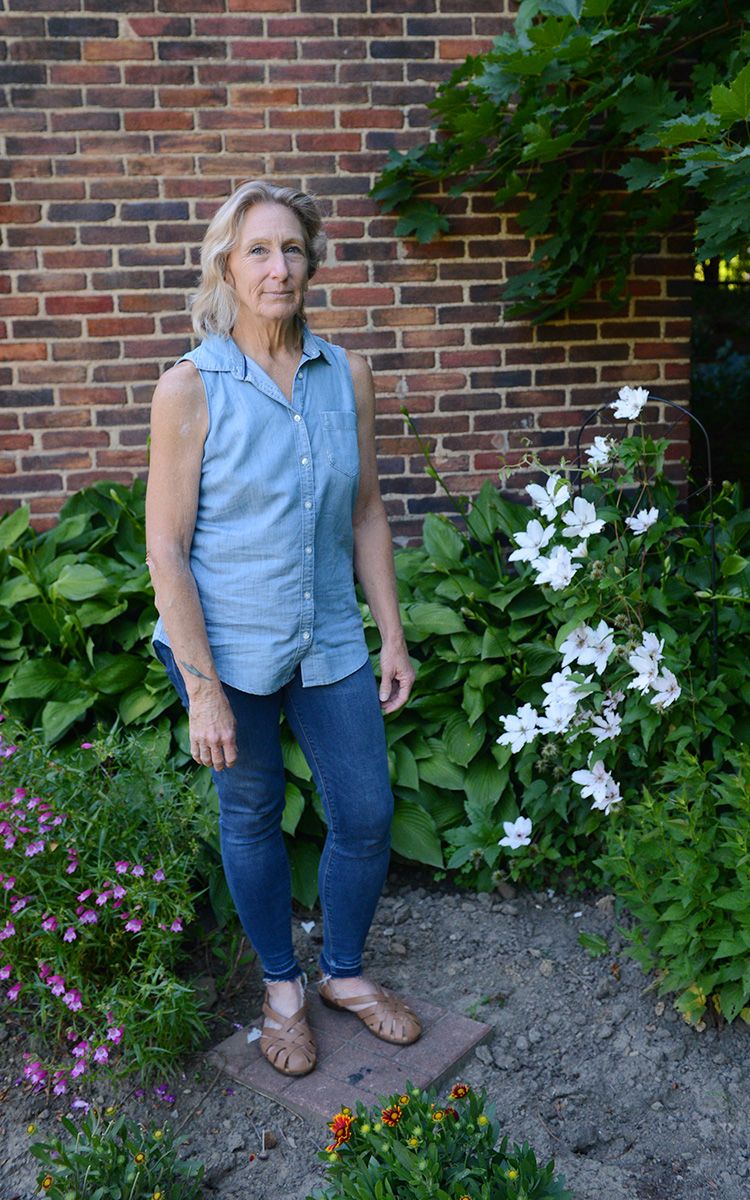
Grounded by creativity
While finding her way through false and confusing realities, Wojnar waited for a diagnosis and relief from symptoms. Though often feeling isolated, she turned to her music and writing.
Her creative outlets, however, could also play a role in the schizophrenic episodes.
“I've had episodes where I would be playing the guitar, and I would hear voices in the strings,” Wojnar recalled. “Music wouldn't necessarily be this safety zone or someplace I could go and get away from it. Sometimes it was the vehicle for it.”
The voices are
In the music
A nightmare
Of hidden messages
Piano keys
Mock me
Guitar strings
Whisper
Even when it would feel like a form of torture, Wojnar never gave up on music, knowing it could give structure to her life and keep her connected to people.
These days, she’s still performing regularly throughout the Cleveland, Akron and Youngstown areas, either solo with her guitar or jamming along with other local musicians.
In 2023, she released her third album, “Starz on the Water,” comprised of all original songs. Some of them she wrote in the ‘80s and ‘90s prior to the onset of her schizophrenia and others she wrote during her illness. Several other musicians from the Youngstown area support Wojnar’s guitar and vocals.
The album, she said, was a way for her to breathe new life into her older songs.
Until recently, Wojnar had never written a song about her experiences with schizophrenia. She had always kept the two separate, thinking that no one would be interested in hearing a song about mental illness.
She had the same reservations about publishing her book of poetry, but after hearing so much positive feedback and interest in her experiences she decided to tackle writing a song. She performed “My Heart Don’t Ever Quit” live for the first time in June in Cleveland Heights.
Wojnar debuted her new song, "My Heart Don't Ever Quit," in June. It's the first song she's written that addresses mental health.
Wojnar debuted her new song, "My Heart Don't Ever Quit," in June. It's the first song she's written that addresses mental health.


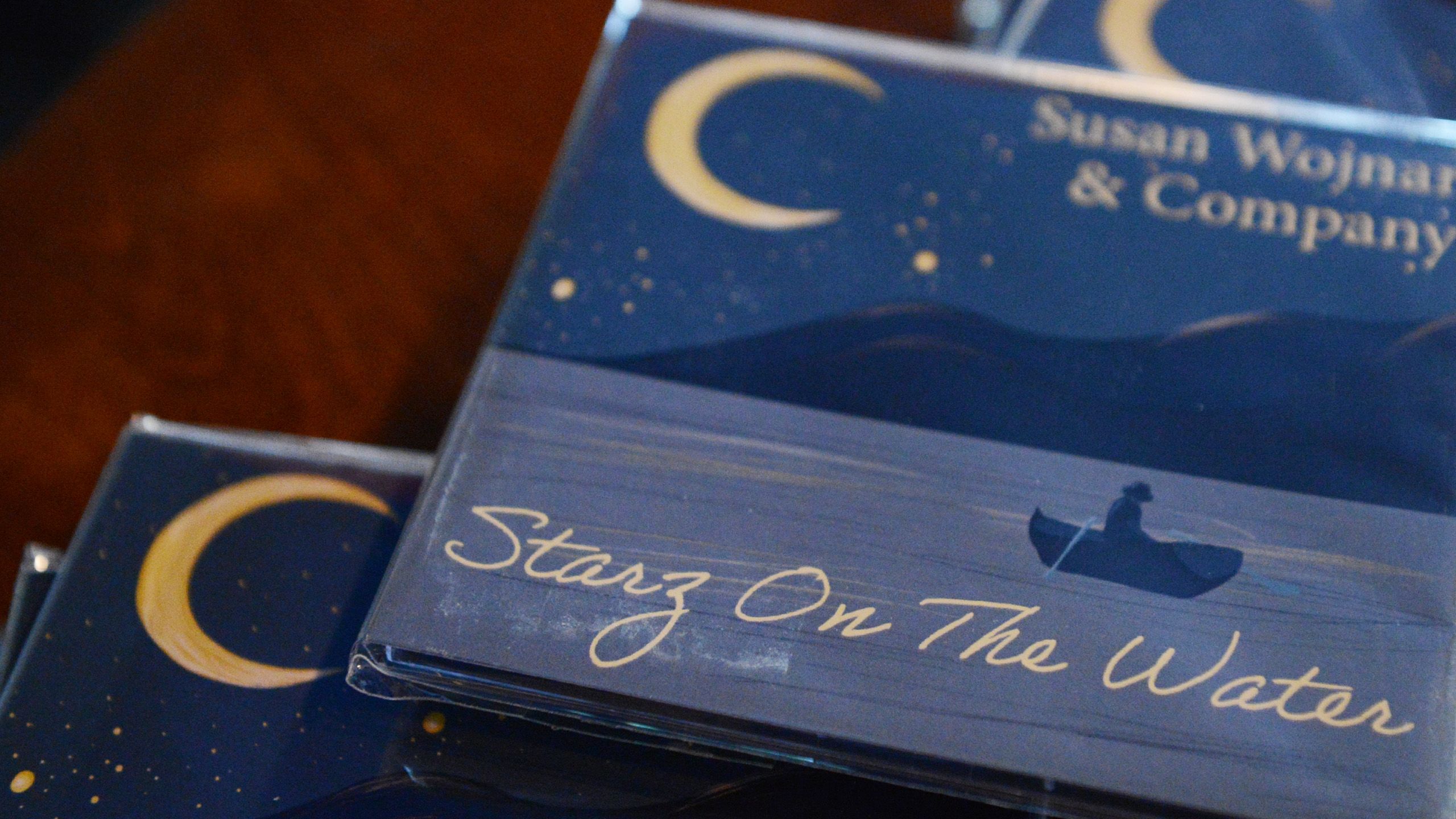
Writing
'White Darkness'


When a friend invited her to join the Youngstown-based group Fallen City Writers around 2010, she turned to the old axiom to write what you know.
“I thought, ‘Well, let me write about what I've been through, what those episodes were like,’” she said. “All writing is therapeutic, whether you want it to be or not.”
Wojnar decided to bring a poem to the group that she had written about one of her episodes and was apprehensive about how it would be received. Everyone was awestruck, she said.
The encouragement of the group inspired Wojnar to continue writing about her schizophrenic experiences and how the illness profoundly affected her daily life as well as relationships with family and her son.
When she had written enough poems to fill a book, she set out to find a publisher with no luck after several attempts. Her close friend Dot Martin encouraged her not to give up, and connected Wojnar to another Northeast Ohio writer, Meredith Pangrace, who was able to help with the publishing process.
Marauders
Silently
Slipping
Through the bars in the window
Drifting
In a row
Miniature shadow people
Crept 'round the walls
Like the old woman
In The Yellow Wallpaper
They were Marauders
Bringing me
A melting sorrow
I could not rise
From my bed
They finished
Creeping
Sat 'round the hearth
Eyeing me
Through the gloom
Stole up the chimney
While I wept
I threw a dime
Into the fireplace
To pay off
The Witches

Wojnar said her ability to remember details of her episodes is both a blessing and a curse.
She was hesitant initially to discuss her experiences, because she was afraid people would overreact and tell her she needed to be hospitalized or given more medication. Instead, she said she received an outpouring of support following the publication of “White Darkness.”
Wojnar has since given presentations at high schools, universities and local bookstores about living with mental illness. She also shares her insights into schizophrenia with medical professionals.
“The reason for the book is not only the fact that hopefully it's good poetry but to kind of shed a light on what it's really like, so that people who have it can see, ‘Well, somebody gets it,’” she said.
Keep moving forward
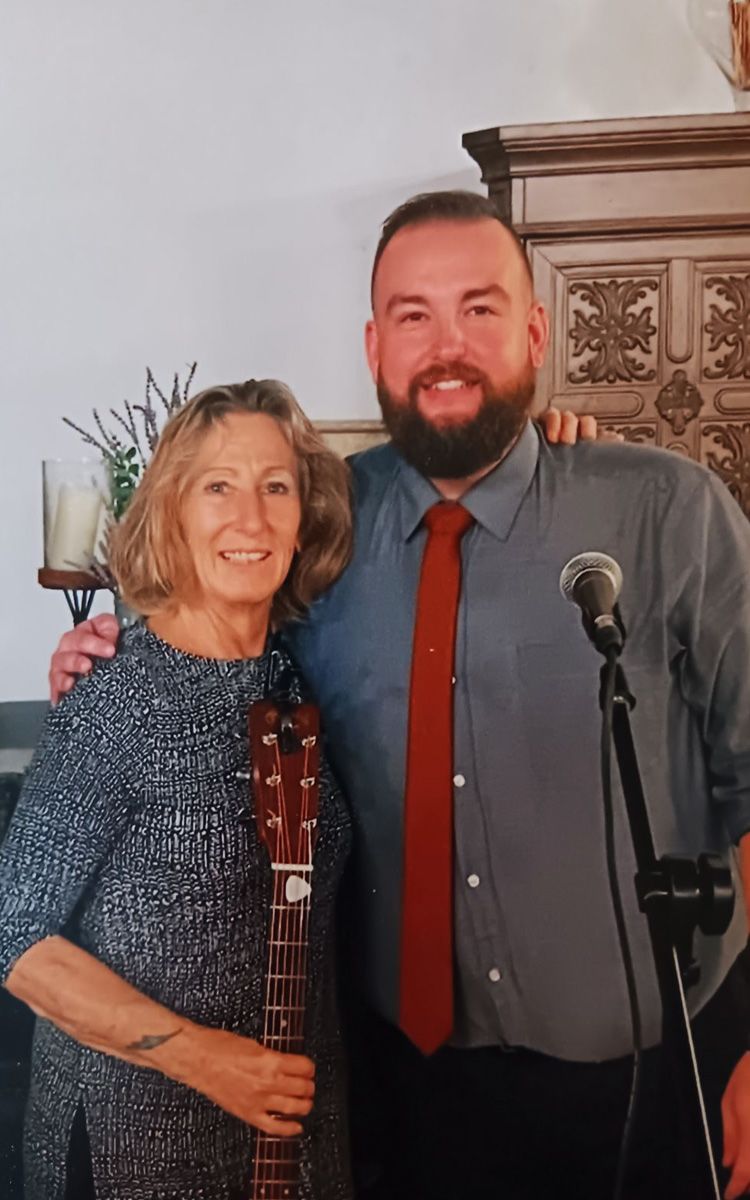
Wojnar with her son, Skylar, 37.
Wojnar with her son, Skylar, 37.
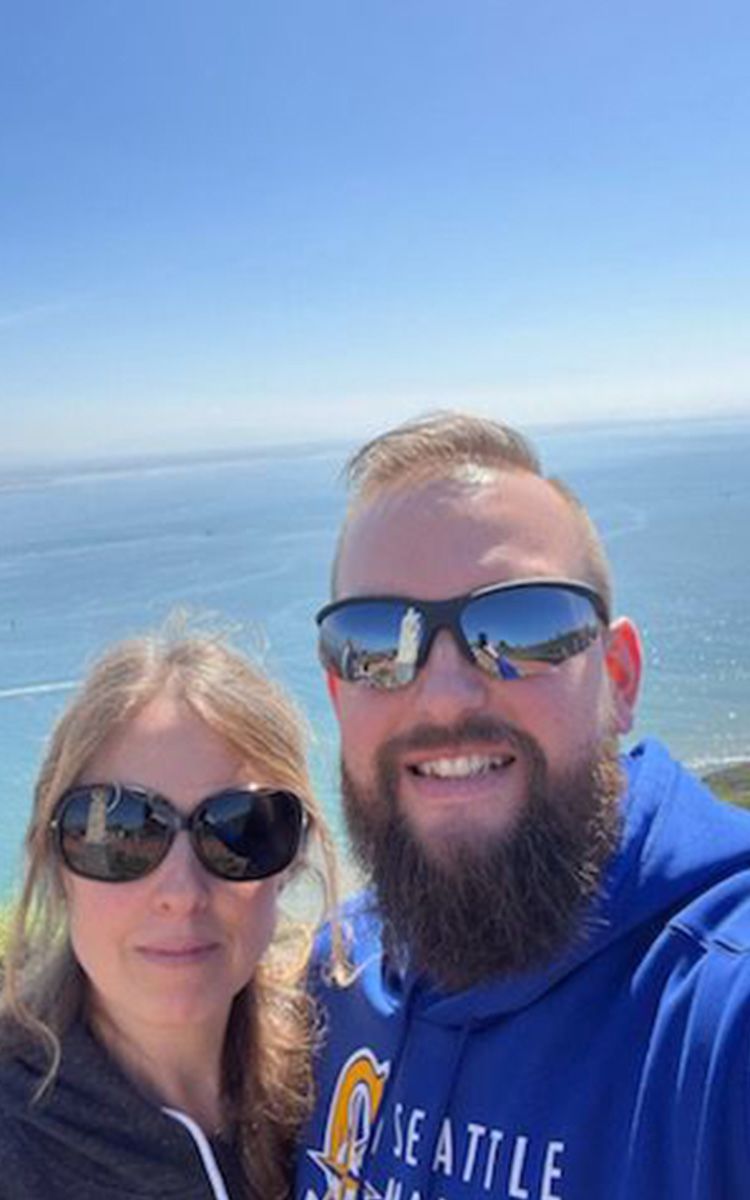
Wojnar's son, Skylar, and his wife, Kathy, are a huge part of Wojnar's support system.
Wojnar's son, Skylar, and his wife, Kathy, are a huge part of Wojnar's support system.
Though there is no cure for schizophrenia, only managing symptoms, Wojnar said she is in a great place these days. The process of publishing her book, giving presentations and having the opportunity to talk to others who live with schizophrenia has helped her recovery.
She also gets a great deal of fulfillment from her career as a social worker in the mental health field, helping others cope with the challenges of everyday life.
She’ll still have episodes from time to time, but she said she now has more control.
“I know it's not real because you recover, you get away from it and you look back and think, ‘That was not real,’” she said. “And that usually leads me out of psychosis.”
No longer feeling alone and isolated, Wojnar has a strong support system of friends and family members. Her son, Skylar, and his wife, Kathy, attend many of her performances, along with Wojnar’s partner, Mick.
And she has her writing and music.
“They allow me, when possible, to get into that zone, which all creative people need. And that brings great relief.”
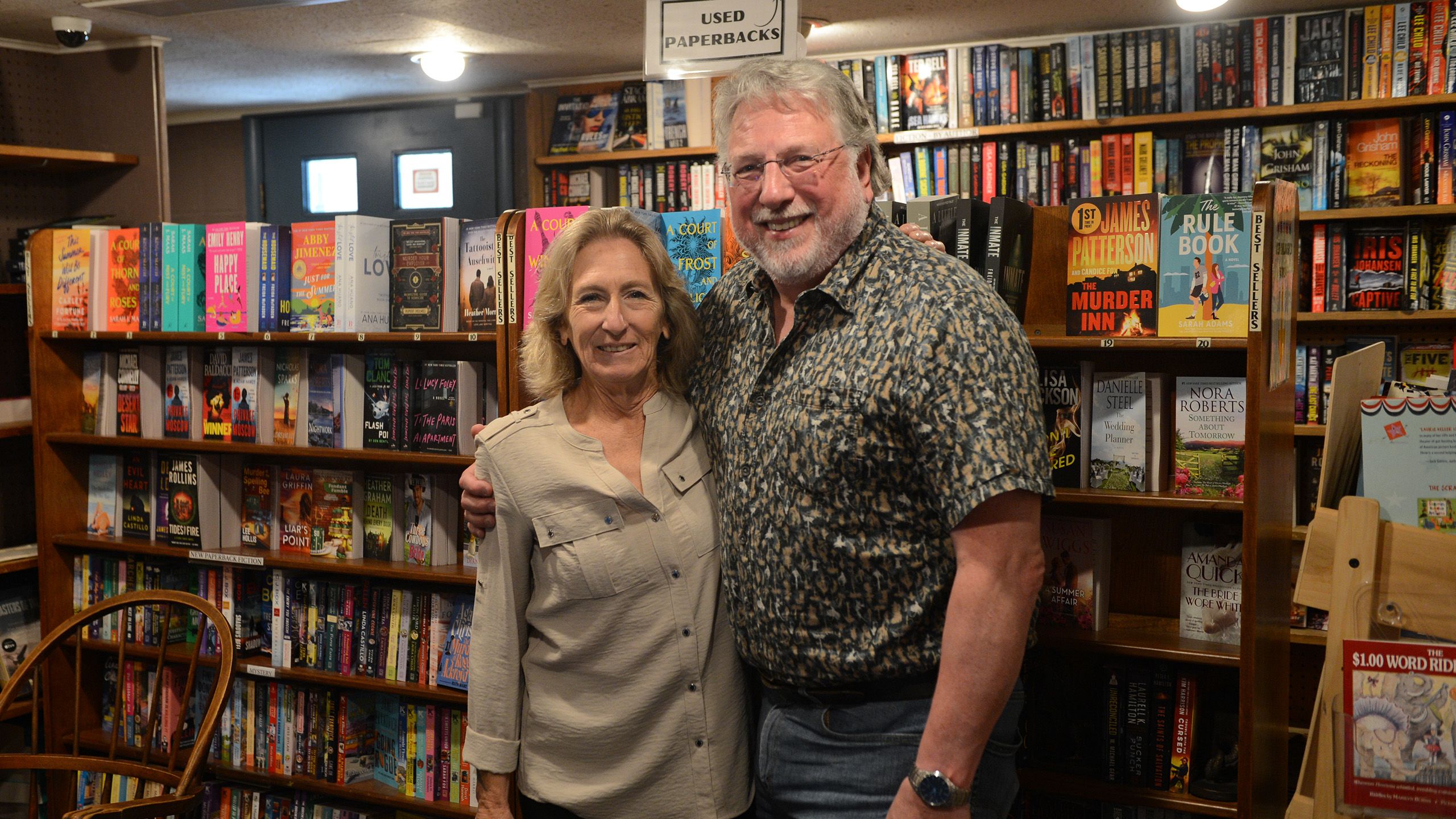
Wojnar with her partner, Mick, after a recent poetry reading event at Fireside Book Shop in Chagrin Falls.
Wojnar with her partner, Mick, after a recent poetry reading event at Fireside Book Shop in Chagrin Falls.

